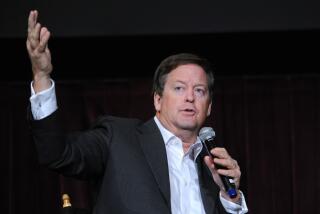Joseph Wershba dies at 90; pioneering CBS producer
- Share via
Joseph Wershba, a pioneering CBS reporter and producer whose work on Edward R. Murrow’s “See It Now” series in the 1950s helped expose the McCarthy era’s communist witch hunt and demonstrated the power of television, has died. He was 90.
Wershba, a two-time Emmy Award winner who was one of the original segment producers on “60 Minutes,” died Saturday of pneumonia at North Shore Hospital on Long Island, said his wife, Shirley.
In what became a more than 50-year career in broadcast and print journalism, Wershba joined CBS radio as a news writer in New York in 1944 and later worked on Murrow’s “Hear It Now” radio series before it moved to television in 1952 as “See It Now.”
Wershba was the on-camera reporter and field producer on “The Case Against Lt. Milo Radulovich A0589839,” a 1953 “See It Now” segment that demonstrated the excesses and dangers of Sen. Joseph McCarthy’s anti-communist crusade and the effects of guilt by association.
The Detroit-born Radulovich, a U.S. Air Force Reserve officer, was accused of being a security risk and stripped of his commission because of his “close and continuing relationship” with his father and sister.
His Yugoslavian immigrant father subscribed to a Serbian newspaper associated with an alleged communist front group, and his sister was a liberal activist who had demonstrated against a Detroit hotel that had refused a room to Paul Robeson, the singer and actor who was well known for his pro-Soviet views.
Wershba recalled in a 2004 article in Quill magazine that when “See It Now” executive producer Fred Friendly saw the footage of his interview with Radulovich, Friendly bellowed over the phone, “You’re fired. I’m fired, Ed’s fired, but we’re going to turn out the greatest broadcast ever done on television!”
After the controversial segment aired, CBS and the show’s sponsor, Alcoa, were inundated with thousands of letters from viewers expressing support for Radulovich, who soon was cleared by the Air Force and had his commission restored.
Wershba also worked on the famous 1954 “See It Now” broadcast in which, as Shirley Wershba said, Murrow “used the senator’s own words to expose the tricks he used to create the Red Scare.”
“We had no idea how the public was going to react,” she told The Times on Monday. “But the public response was in favor of Murrow. They didn’t realize what an evil man McCarthy was.”
Recalling those two seminal “See It Now” broadcasts, “60 Minutes” correspondent Morley Safer said “these were stories that transfixed the country.”
“Joe, along with Murrow and a half dozen other people, embodied the idea of a responsible news division,” Safer, who worked with Wershba on “60 Minutes,” told The Times on Monday. “Those were legendary days for CBS News.”
Murrow’s battle with McCarthy was the subject of “Goodnight, and Good Luck,” the 2005 movie directed and co-written by George Clooney.
The Wershbas, who were interviewed by Clooney at their home while he and co-writer Grant Heslov were working on the script, served as consultants on the film.
They also turned up as characters played by Robert Downey Jr. and Patricia Clarkson after mentioning that they had met while working as news writers on the night shift at CBS and defied the network’s anti-nepotism rule by marrying in 1948.
Wershba, whose early career at CBS included working with Walter Cronkite on the network’s TV affiliate in Washington, D.C., worked as a reporter and columnist at the New York Post from 1958 to 1964. While at the Post, he was nominated for a Pulitzer Prize for his investigative report on President Kennedy assassin Lee Harvey Oswald’s early years in New York.
In 1964, he returned to CBS News as a producer and worked on documentaries for “CBS Reports.” When “60 Minutes” was launched in 1968, he became one of the six original segment producers.
During his 20 years with “60 Minutes,” he won two Emmy Awards while working with Safer in the 1970s: for an investigation of the Gulf of Tonkin incident and for a profile of Jerusalem Mayor Teddy Kollek.
Wershba, who was born in Manhattan on Aug. 19, 1920, attended Brooklyn College, where he was editor of the campus newspaper, and served in the Army during World War II. After retiring from “60 Minutes” in 1988, he and his wife started a film production company.
In addition to his wife of 63 years, he is survived by his daughter, Randi Wershba-Kornreich; his son, Donald; his brother, Charles; and two granddaughters.
More to Read
Start your day right
Sign up for Essential California for the L.A. Times biggest news, features and recommendations in your inbox six days a week.
You may occasionally receive promotional content from the Los Angeles Times.







